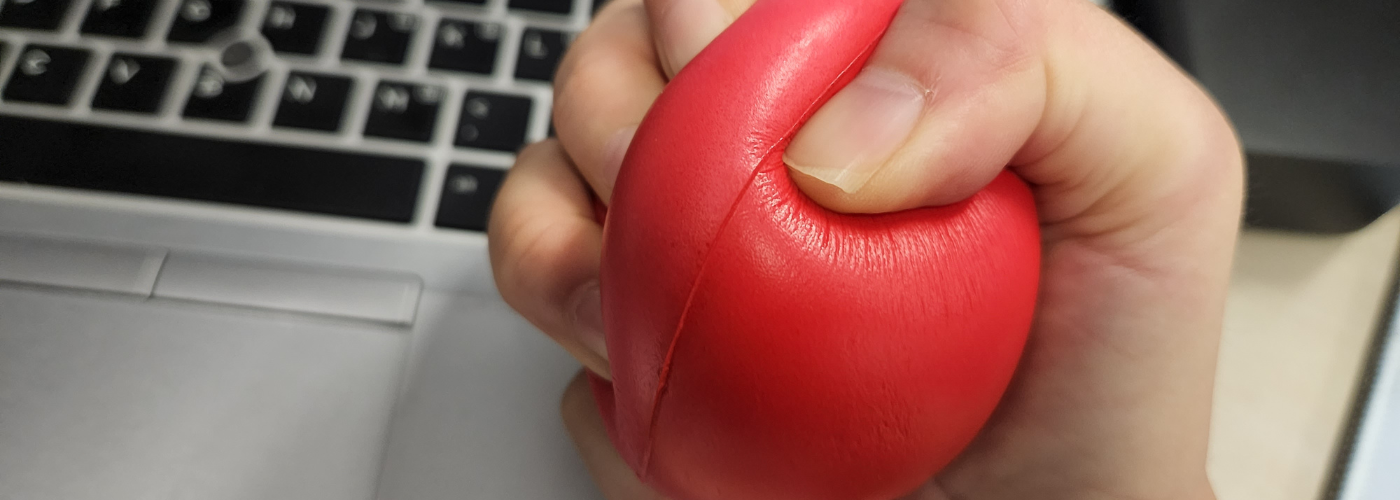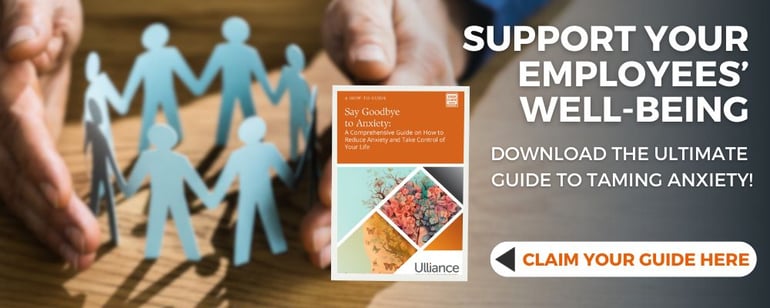Anxiety is a common and often debilitating mental health condition that affects millions of people worldwide. It is characterized by excessive worry, fear, and nervousness, often accompanied by physical symptoms such as rapid heart rate, shortness of breath, and muscle tension.
An Estimated 31.1% of U.S. adults experience an anxiety disorder at some time in their lives. ~ National Institute of Mental Health
While anxiety can be a normal part of life, excessive or prolonged anxiety can significantly impact a person's daily life, relationships, and overall well-being.
Understanding Anxiety
According to the National Institute of Mental Health, anxiety comes in many forms, each with its unique characteristics. Here are the most common forms:
- Generalized anxiety is characterized by persistent and excessive worry about a variety of things, often accompanied by physical symptoms.
- Social anxiety involves intense fear and self-consciousness in social situations, leading to avoidance and isolation.
- Panic disorder is marked by sudden and intense episodes of fear, often accompanied by physical symptoms such as palpitations, dizziness, and shortness of breath.
Other forms of anxiety include specific phobias, post-traumatic stress disorder, obsessive-compulsive disorder, and separation anxiety disorder.
Anxiety levels can be classified into four categories: mild, moderate, severe, and panic level.
The causes of anxiety are complex and multifaceted. Biological factors, such as genetics and brain chemistry, play a role, as do environmental factors, such as stressful life events, trauma, and substance abuse. Anxiety can also be exacerbated by certain lifestyle factors, such as poor sleep, lack of exercise, and an unhealthy diet.
Anxiety can have a profound impact on both physical and mental health. Physical symptoms such as fatigue, headaches, and digestive problems are common. Anxiety can also lead to emotional distress, difficulty concentrating, impaired social functioning, and poor job performance. In severe cases, anxiety can lead to depression and self-harm.
What are the Symptoms of Anxiety?
The symptoms of anxiety can vary from person to person, and they may manifest differently depending on the type of anxiety disorder. Common physical and psychological symptoms include:
- Excessive worry or fear
- Restlessness or feeling on edge
- Muscle tension or aches
- Rapid heart rate
- Shortness of breath or difficulty breathing
- Dizziness or lightheadedness
- Difficulty concentrating
- Irritability or agitation
- Avoidance of certain situations or activities
If you experience any of these symptoms on a regular basis and they interfere with your daily life, it may be a sign that you are struggling with anxiety.
Coping With Anxiety in the Short-Term
When anxiety strikes, it can be helpful to have a toolbox of coping strategies to manage the symptoms and regain a sense of calm. It's important to remember that everyone's experience with anxiety is unique. What might work for one person might not work for another. That's the beauty of having a toolbox of strategies; it allows you to find what works best for you in different situations.
Keep in mind that it's okay to try different strategies and that it might take some time to find what helps you the most. What matters is that you're taking steps toward managing your anxiety, and every step, no matter how small, is a victory.
Here are some short-term coping strategies that can help you manage your anxiety symptoms, regain control, and navigate life with a bit more ease.
Breathing Techniques
Deep, controlled breathing can help to slow your heart rate and calm your mind. Try inhaling deeply to the count of four, holding your breath for seven counts, and exhaling slowly to the count of eight. This method is known as the "4-7-8" technique and can be done anywhere, anytime.
Meditation or Focused Muscle Relaxation
This strategy involves focusing on the present moment and accepting it without judgment. Whether it's concentrating on your breath, sounds, or simply the sensations in your body, mindfulness meditation can reduce anxiety and promote relaxation. Progressive muscle relaxation involves tensing and then releasing each muscle group in the body. It can help you become more aware of physical sensations and provide a sense of calm.
Physical Activity
Regular exercise is a natural anxiety reliever. It releases endorphins, the body's natural painkillers and mood elevators. Be it a brisk walk, yoga, or a high-intensity workout, find what you enjoy and make it a part of your routine.
3-3-3 Exercise
As its name suggests, this simple technique involves three sets of three. First, look around you and name three things you see, then three sounds you hear. Finally, name three parts of your body. This mental trick can help you recenter your mind.
Balanced Eating
Anxiety can lead some people to develop unhealthy eating habits. If you have been over - or undereating, or not eating a well-balanced diet, making a switch can help lessen symptoms of anxiety, even in the short term. That's because foods rich in vitamins, minerals, and antioxidants can help reduce inflammation in the brain, promoting better mood regulation.
Social Connection
Reach out to people you trust and share what you're going through. Open communication can help you feel understood and alleviate feelings of isolation and loneliness.
Long-Term Strategies for Managing Anxiety
While short-term coping strategies can provide temporary relief, it is essential to address the root causes of anxiety and develop long-term strategies for managing it. While anxiety can manifest in various forms, its roots often lie in our thoughts and perceptions. By cultivating a mindset that fosters resilience and positivity, we can effectively minimize the likelihood of anxiety taking hold.
Here are key strategies to prevent anxiety from taking root:
Professional Help
Therapists and psychologists are trained to help you understand your feelings, develop coping strategies, and work towards a healthier mental state. Your employee assistance program is a great place to start. They can provide resources and direct you to a therapist or counselor who can provide tools and techniques tailored to your specific needs.
Lifestyle Changes
Lifestyle changes such as getting regular exercise, eating a healthy diet, and practicing good sleep hygiene can have a positive impact on managing anxiety. It's also essential to minimize or avoid substances that can worsen symptoms, such as alcohol and caffeine.
SElf-Care
Self-care is not selfish; it is an important aspect of managing anxiety. Taking care of your physical, emotional, and mental well-being can help reduce stress and promote relaxation. This can include activities like taking a bath, reading a book, or spending time in nature.
Challenge Negative Self-Talk
Our inner critic can be a relentless source of anxiety, constantly bombarding us with negative thoughts and self-doubt. To combat this, practice identifying and challenging these negative self-talk patterns. When a negative thought arises, question its validity. Ask yourself if there is evidence to support this thought or if it's simply an irrational fear. Replace negative thoughts with more realistic and positive ones.
Embrace Mindfulness and Gratitude
Mindfulness is not just a short-term strategy for dealing with anxiety; it can be an important part of a longer-term effort as well. Focusing on the present moment without judgment allows us to appreciate the here and now rather than dwelling on past regrets or future worries. Mindfulness practices, such as meditation and deep breathing, can effectively reduce anxiety by calming the mind and body.
Additionally, cultivating an attitude of gratitude can shift our focus from perceived shortcomings to the abundance that surrounds us.
Nurture Self-Compassion
Self-compassion involves treating ourselves with kindness and understanding, especially when we face challenges or make mistakes. Instead of harsh self-criticism, practice self-acceptance and acknowledge that everyone experiences setbacks. This self-compassion fosters resilience and reduces the likelihood of anxiety spiraling out of control.
Preventing anxiety is an ongoing process, and it's okay to seek professional help if needed. By adopting these preventative measures and cultivating a positive mindset, you can empower yourself to manage anxiety and live a fulfilling life.
5 WAYS EMPLOYERS CAN HELP
Employers can play a crucial role in promoting mental health and supporting employees who may be struggling with anxiety.
1. Provide resources
Make sure to offer information on mental health resources, such as an employee assistance program, counseling services, or support groups.
2. Create a Supportive Work Culture
Foster open communication, encourage self-care, and promote work-life balance. This can help reduce stress and create a positive work environment.
3. Offer Mental Health days or Flexible schedules
Sometimes, taking a break from work can be beneficial for managing anxiety. Giving employees the option to take a mental health day or adjust their schedule can make a significant difference.
4. Educate managers and supervisors
Ensure that managers and supervisors are educated on anxiety and other mental health challenges and know how to support employees who may be struggling.
5. Normalize mental Health Conversations
Encourage a culture where employees feel comfortable talking about their mental health and seeking help when needed. This can reduce stigma and promote a supportive workplace.
Preventing anxiety is an ongoing process, and it takes effort from both individuals and employers.
You Can Take Control of Anxiety
Experiencing anxiety at some point is a reality for many of us. It's important to remember that your worth is not defined by your struggle with anxiety, and that you possess the ability to adapt and grow.
By adopting short-term strategies, you can begin the process of taking control of anxiety in the long term.
When you partner with Ulliance, our Life Advisor Consultants are always just a phone call away to teach ways to enhance your work/life balance and increase your happiness. The Ulliance Life Advisor Employee Assistance Program can help employees and employers come closer to a state of total well-being.
Investing in the right EAP or Wellness Program to support your employees will help them and help you. Visit https://ulliance.com/ or call 866-648-8326.
The Ulliance Employee Assistance Program can address the
following issues:
• Stress about work or job performance
• Crisis in the workplace
• Conflict resolution at work or in one’s personal life
• Marital or relationship problems
• Child or elder care concerns
• Financial worries
• Mental health problems
• Alcohol/substance abuse
• Grief
• Interpersonal conflicts
• AND MORE!
Have some questions about our services? Book a quick meeting below!
References:
11 Tips for Coping With Anxiety Disorder; Siri Kabrick; Mayo Clinic Health System, https://www.mayoclinichealthsystem.org/hometown-health/speaking-of-health/11-tips-for-coping-with-an-anxiety-disorder
Do You Live with Anxiety? Here Are 13 Ways to Cope; Healthline
https://www.healthline.com/health/mental-health/how-to-cope-with-anxiety
Exploring the Benefits of Meditation for Anxiety; Healthline
https://www.healthline.com/health/anxiety/meditation-for-anxiety
How To Do the 4-7-8 Breathing Exercise; Cleveland Clinic
https://health.clevelandclinic.org/4-7-8-breathing/
How to Take Control of Anxiety; Forrest Talley Ph.D.; Psychology Today, https://www.psychologytoday.com/us/blog/relationship-emporium/202103/how-take-control-anxiety
Managing and Reducing Anxiety; AdultMentalHealth.org, https://adultmentalhealth.org/managing-and-reducing-anxiety/


